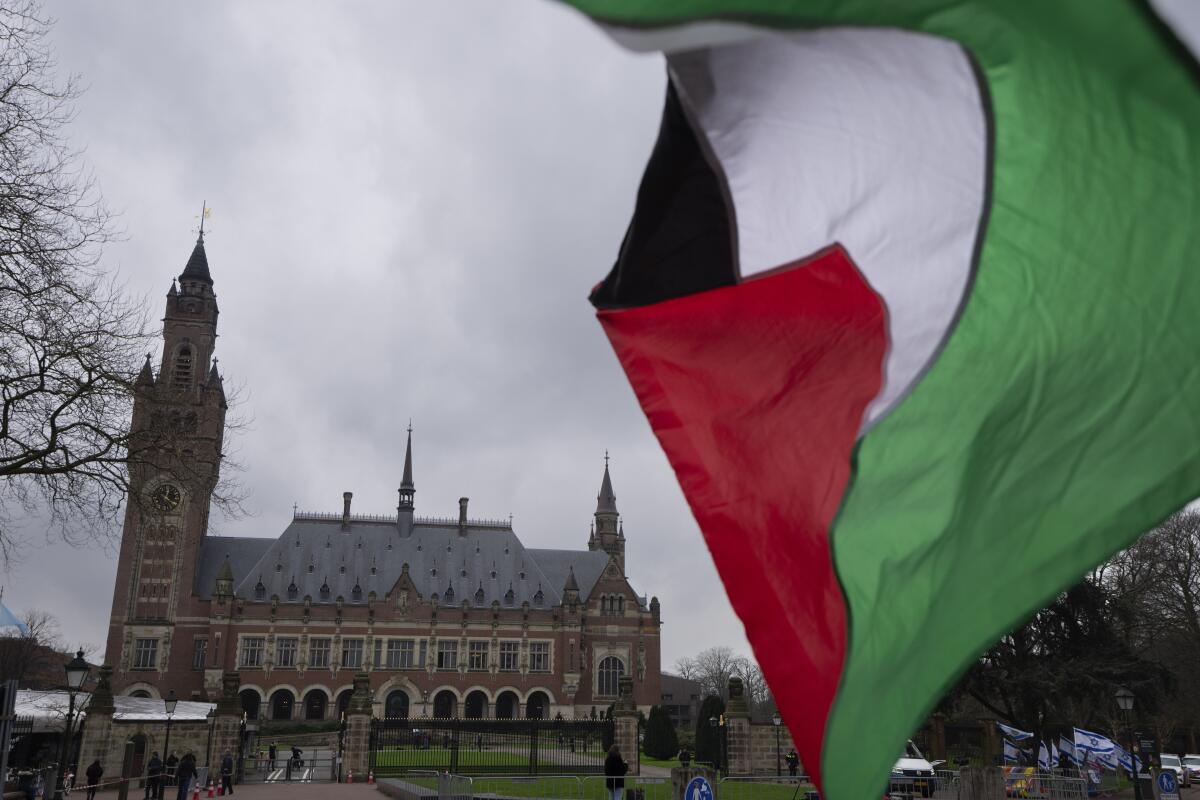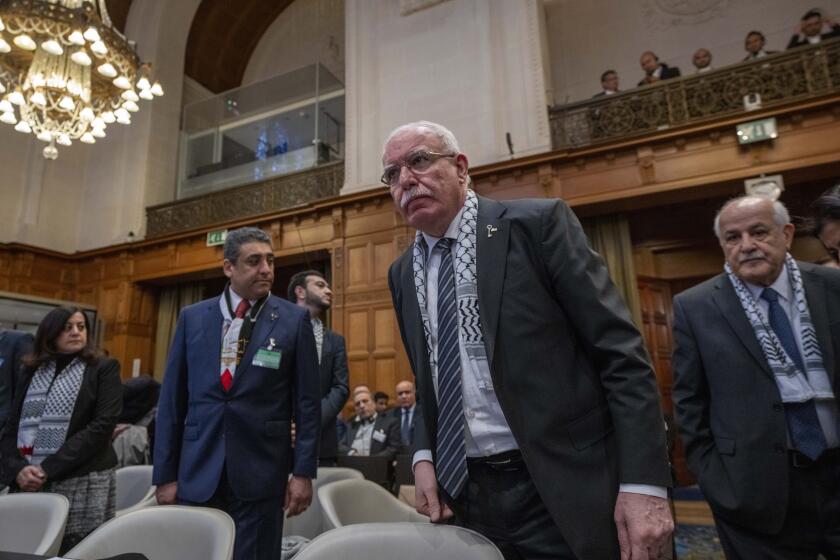At historic U.N. court hearing, majority of countries argue Israel violated international law

- Share via
THE HAGUE — The United Nations’ highest court on Monday wrapped up historic proceedings into the legality of Israel’s 57-year occupation of lands sought by Palestinians for a future state, with most voices at the hearing arguing against the Israeli government.
Over six days, the International Court of Justice heard from an unprecedented number of countries and the majority argued Israel was violating international law and called for the establishment of an independent Palestinian state.
“The real obstacle to peace is obvious — the deepening occupation by Israel of the Palestinian territories, including East Jerusalem, and failure to implement the two-state vision, Israel and Palestine living side by side,” Turkish Deputy Minister of Foreign Affairs Ahmet Yildiz said.
The hearings addressed a request by the U.N. General Assembly for a nonbinding opinion on the legality of Israel’s policies. The court says it will issue its opinion in “due course.” On average, advisory opinions are released six months after oral proceedings.
Accused of committing genocide against Palestinians, Israel defended its war on Hamas in Gaza at the United Nations’ highest court at The Hague.
Fiji was one of a handful of countries to argue that the court should refuse the request and directly mentioned the Hamas attack that set off the war in Gaza and left about 1,200 Israelis dead while Hamas militants also took nearly 250 others hostage.
“The events of 7 October 2023 have shown us what could happen if there were a complete and unconditional withdrawal without the necessary arrangements in place to guarantee the security of Israel,” Filipo Tarakinikini said on behalf of the South Pacific Island nation.
The United States also cautioned the court against issuing an opinion, calling for an immediate withdrawal from the territories. Acting State Department legal advisor Richard Visek said last week the judges should not seek to resolve the decades-long Israeli-Palestinian conflict “through an advisory opinion addressed to questions focusing on the acts of only one party.”
Palestinian Foreign Minister Riad Malki had previously urged the 15-judge panel to uphold the Palestinian right to self-determination and to declare “that the Israeli occupation is illegal and must end immediately, totally and unconditionally.”
Though the hearings were held against the backdrop of the Israel-Hamas war, in which more than 29,000 Palestinians have been killed, according to Gaza’s Health Ministry, it predated this round of conflict and focused instead on Israel’s open-ended occupation of the West Bank, the Gaza Strip and East Jerusalem.
The Palestinian Authority’s foreign minister accuses Israel of apartheid and urges the top U.N. court to declare that Israel’s occupation is illegal.
Late last month, the court ordered Israel to do all it can to prevent death, destruction and any acts of genocide in its military offensive in Gaza. South Africa also filed a separate case accusing Israel of genocide because of its actions in the Strip, a charge that Israel denied.
Israel rejects accusations that its treatment of Palestinians amounts to apartheid and has accused U.N. bodies and international tribunals of bias.
It did not participate in the oral proceedings but, in a five-page written submission, Israel said the questions put to the court are prejudiced and “fail to recognize Israel’s right and duty to protect its citizens.”
Israel captured the West Bank, East Jerusalem and the Gaza Strip in the 1967 Mideast war. The Palestinians seek all three areas for an independent state. Israel considers the West Bank to be a disputed territory, whose future should be decided in negotiations.
The peace process has repeatedly stalled because of Palestinian attacks, Israel’s expansion of settlements in occupied territory and the inability of the two sides to agree on issues such as final borders, the status of Jerusalem and the fate of Palestinian refugees.
In 2004, the court said that a separation barrier Israel built through East Jerusalem and parts of the West Bank was “contrary to international law.” It also called on Israel to immediately halt construction. Israel has ignored the ruling.
More to Read
Sign up for Essential California
The most important California stories and recommendations in your inbox every morning.
You may occasionally receive promotional content from the Los Angeles Times.















